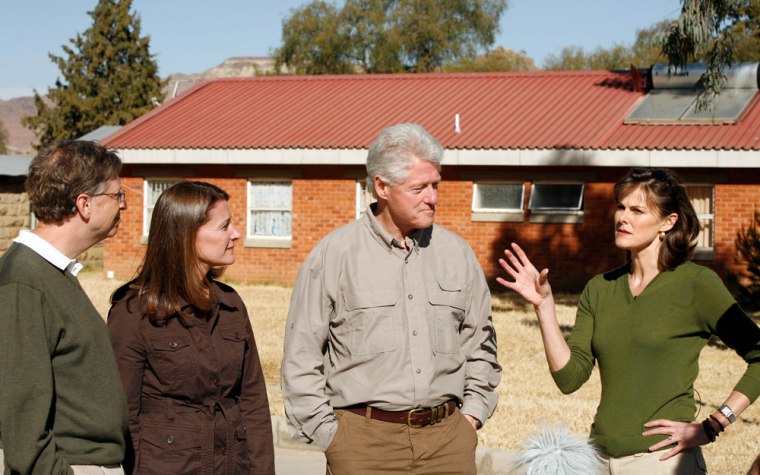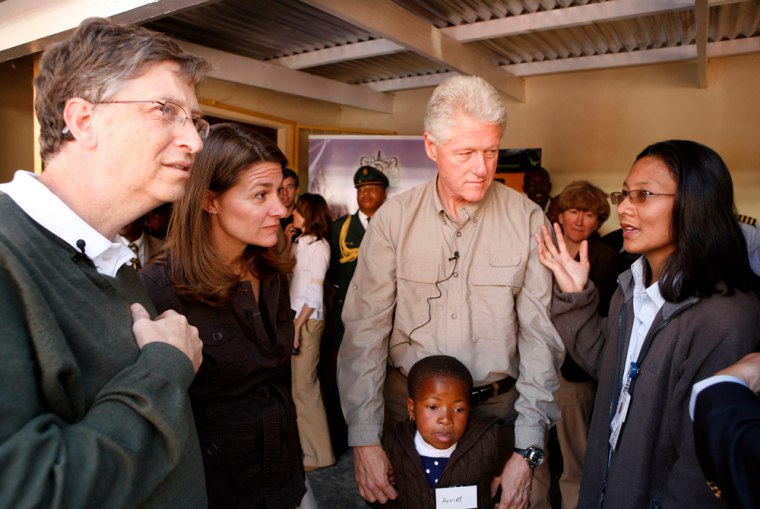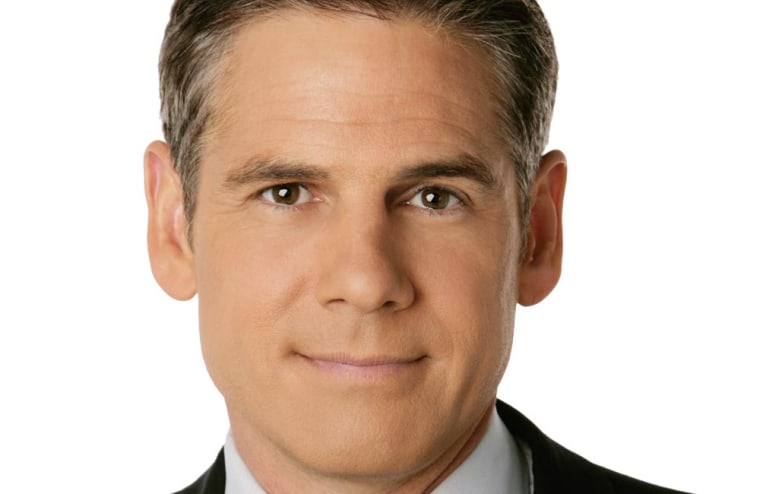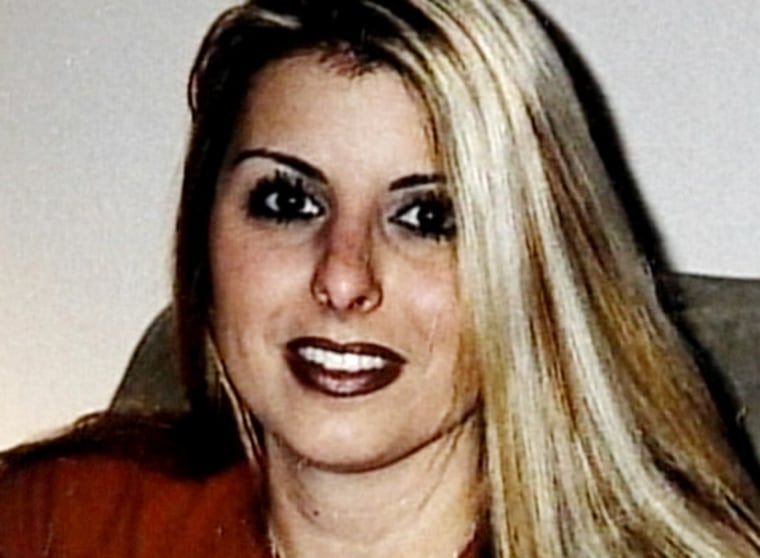• July 13, 2006 |
On tour with Bill Gates and former President Bill Clinton (Campbell Brown, NBC News)

The world's richest man and the ex-president who still gets rock star treatment around the world are, individually, two of the most fascinating people I have ever covered. Watching them together, side by side, adds a whole new dimension and makes them all the more compelling. Clinton and Gates, along with Gates' wife Melinda, have made enormous commitments through their respective foundations to improving global health. They are concentrating their efforts on fighting AIDS in the developing world. The Gates Foundation programs center on AIDS prevention and the Clinton Foundation on AIDS treatment. Traveling together in Africa, the two Bills are trying to spotlight some of their projects, with the clear recognition that joint appearances offer an alluring new angle to a story that sadly gets too little coverage.
Together, they are hypnotic. Stylistically, they seem both at odds and oddly complimentary. One (you guess which) is driven by emotion, fully immersed in the sensory experience. We visited an AIDS treatment center in the tiny country of Lesotho that is funded in large part by the Clinton Foundation. Clinton held the hand of a young girl with AIDS during most of the visit. His focus was on listening to the stories of victims, like the one told to us by a teenage girl who had been raped and infected with HIV. Gates' interest was equally intense, but directed more at how the clinic was run, areas where additional help was needed, specifics on what was working and what wasn't. Physically he was reserved, even distant, but intellectually just as engaged.

Balancing the extremes of Clinton and Gates was Gates' wife Melinda. She is the driving force behind the Gates Foundation and its true voice. She is both knowledgeable and engaging, and deeply committed to finding ways to empower women to protect themselves from HIV infection. I had never heard of microbicides before this trip, but they are Melinda's passion. The simplest explanation: a gel-based substance that women apply vaginally to, theoretically, block the transmission of HIV. The idea behind them is to provide a method of protection to women in developing countries who are in subservient roles and often have little or no say over whether a condom is used during sex. The problem with microbicides is they have yet to be proven effective. In Durban, South Africa, we visited a clinic funded by the Gates Foundation where microbicide testing is now underway. The medical experts there say they are still years from finding one that is effective. But the Gates Foundation has committed over a billion dollars to funding research. Melinda Gates, in her words, believes that finding a microbicide that works could break the back of AIDS in Africa.
During an in-depth interview (obligatory plug: airs Tuesday, July 18 on "Today" and Friday, July 21 on "Dateline") the Gateses and Clinton all acknowledged that the real solution, an AIDS vaccine, is likely 10, even 20, years away. But none of the three seem at all daunted by the challenge. Their styles may be different, but their dedication seems equal. It is a powerful partnership.
Campbell Brown is currently in Africa. Her report on this trip airs on the Today Show Tuesday and on Dateline next Friday. Read former President Clinton's piece in last month's Newsweek on his quest to improve AIDS care.
• |
Faking cancer (Rob Stafford, Dateline correspondent)

Imagine if your best friend tells you she's dying of cancer. She is a 29-year-old mother of five young boys and she has only nine months to live. You would probably react the same way two women I interviewed for Friday's Dateline did. They say they rallied to help their friend, offered to care for her boys, searched the Internet for the best cancer treatments and attended and organized fundraisers to help pay medical bills. They say they cried and prayed and cried some more.
Now, imagine nine months later your dying friend looks better than ever. She is fit and tan and you're not quite sure why, especially since she's been undergoing chemotherapy and radiation and dialysis treatments that normally debilitate people. Was it possible your friend wasn't really sick? Was is possible this person you thought you knew so well had been lying to you?

Friday's story is a story about betrayal. And the women you will hear from will tell you being betrayed by your best friend is a con too cruel for anyone to imagine. In fact, they would never have believed it unless a private investigator's hidden camera had captured the cancer scam on tape.
Jennifer Dibble and the story about her fake cancer airs Dateline Friday, July 21, 8 p.m.
• July 19, 2006 |
Scamming and betraying family and friends (Olive Talley, Dateline producer)
When private investigator Ozzie Allsbrooks called me to tell me about this investigation, I had a hard time believing it. But it was clear from talking to Ozzie, this was far more than an ordinary case for him. It was personal.
How could a young mother of five sons tell her own children she's dying of cancer, along with other relatives and friends and then be lying about it? It was hard to fathom -- until we saw numerous court records, the undercover surveillance tapes and talked to the very friends this woman had betrayed. It was an undeniable scam.
As our story reveals, Jennifer Dibble was convincing. Who wouldn't be sympathetic to someone who posted e-mails like these that Jennifer, under her pen name of "fiveboysmom," posted on an Internet parents' support group?
Certainly, the immediate family members of Jennifer and Brian Dibble and their friends were hurt by her actions. But Ozzie Allsbrooks, the private investigator who helped expose the fraud, said he fears even greater fallout for future cancer victims who need the support of strangers. Read to this exchange with correspondent Rob Stafford:
Rob: What bothers you the most about this case? Ozzie: That it went on for this length of time. That so many people trusted and believed in her apparent ordeal. They gave unselfishly time and time again and she was faking it the whole time. It irritates me that I had a brother that really did have cancer who passed away in May and left four kids of his own. And, of course, the damage it does to the community. The people that actually gave of their hard-earned money and gifts to her and so forth -- and it was all for nothing. Just so that she could live the way she wanted to live. Rob: Who are the victims here? Ozzie: The victims? The first victims I think of are her very own sons. They believed their mother was gonna die. And then you have the family members that rallied around her and sacrificed to support her financially, mentally and emotionally. All of the people in the support group that she consulted with that she sought after and wanted their help and they rallied around in ways that it would take too long to describe. And then the last victims, are all of these victims that'll hear this telecast and they'll think about, "Well, gee-whiz, I wonder if these people we're supporting or this guy we're supporting or this girl we're supporting, I wonder if she's really sick or really ill.' They'll question things. There are a lot of people out there that need the help of the kind of people that came to her aid. And they may not go to anybody's aid anymore. They're going to be extremely reluctant. I hate what she did to cause that. "
Finally, for Ozzie, there's the question of justice. It's been two years since this fraud was exposed in open court in Fort Worth, Texas. Yet, no criminal charges have been filed. Ozzie, a former policeman, considers it an "open and shut" case of fraud. He said he's shared all his evidence with the FBI and the U.S. Attorney's office in Dallas/Fort Worth.
A spokeswoman for U.S. Attorney Richard Roper says the case is still under investigation. State prosecutors have told Allsbrooks they're waiting to see what, if any, action is taken by federal authorities before they decide if they will open a case.
A search of the Internet and newspaper databases reveals many similar cases that have resulted in criminal prosecution. Last year in Georgia, after he pleaded guilty to 12 counts of theft by deception.
In Louisiana last year, a former Shreveport policeman and his wife were in order to collect donations and loans.
In Las Vegas last year, a federal grand jury indicted by telling them she was dying of cancer and taking money from benefits held on her behalf.
In Utah last September, the wife of a federal drug agent was sentenced to jail time after she pretended to have cancer. The Salt Lake Tribune quoted the judge as saying, "You have inflicted damage that will never be corrected." He went on to say that some of the donors were her children's classmates who have lost their innocence by being victims of the scam.
Finally, two Ohio women were ordered to spend time behind bars for their respective fake cancer schemes. One woman . Another woman shaved her daughters' hair and gave her sleeping pills to .
For Ozzie Allsbrooks, it's more than a matter of law. It's personal.
His brother died of cancer in May 2005, leaving four children behind. In the future, Ozzie hopes to start a non-profit that can help people check out the claims of people who seek money from the public for medical help BEFORE they donate. He said real victims of cancer and other life-threatening illnesses need support while donors need to know that their money is going for a genuine cause. And, as Ozzie knows painfully well, it can be a matter of life and death.